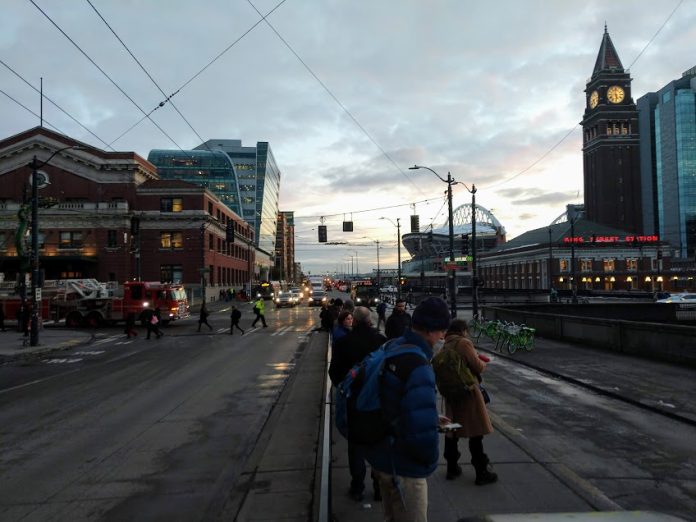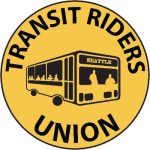We’re joining the lawsuit against Initiative 976. Along with the disability rights group Washington ADAPT and the Northwest-based clean energy economy nonprofit Climate Solutions, Seattle Transit Riders Union (TRU) is intervening in the suit that was filed on November 13th by the Garfield County Transportation Authority, King County, the City of Seattle, and other plaintiffs.
Transit riders, especially those of us who depend on public transit every day, have everything to lose if this measure is allowed to stand. The impacts to our quality of life will be drastic and unacceptable. Our voices need to be heard in this case.
“I heard about I-976 on election night, and my heart fell,” says Naomi Adele, who cannot drive due to a disability and also can’t afford a car. “I regularly take the 7, the 106, the 45, the 48, and the 373. I use many other routes, too. I’m scared for what the future looks like for me, and for other people even more vulnerable and disenfranchised than I am. For some people, reliable public transit is the difference between a job and homelessness.”
In 2015, we fought alongside the courageous students at Rainier Beach High School (RBHS) who led the campaign to win free ORCA transit passes for low-income high school students. Last year Mayor Jenny Durkan expanded this program to include all high school students, many middle school students, Seattle Promise Scholars, and 1,500 residents of low-income housing. All these people could lose their reliable access to transit and the freedom and opportunity that comes with it.
“With my ORCA card I am able to get to all the places I need to be for free,” says Nathan Villar, an 11th grade student at RBHS. “It saves me about $5 a day and I usually spend that on food that I wouldn’t be able to afford without my ORCA card.”
“Our students organized and fought hard to win these free ORCA passes and this program has been celebrated as highly successful by city officials, students, staff and families,” says Chelsea Gallegos, the School Social Worker at RBHS. “To lose ORCA passes for students over a funding gap would be demoralizing and yet another burden placed on our students who are already furthest from educational justice due to systemic inequities within the public school system.”
King County reports that I-976 could result in $12.2 million in cuts to the Access paratransit program, which serves people with disabilities who find it difficult to use King County Metro’s fixed-route buses.
“I remember my first Access ride after getting approved for service. It literally felt like liberation,” says Lynn Sereda, who has often relied on the service due to severe osteoarthritis. “The simple experience of being able to leave your house and go places, is something I had always taken for granted. Disability can take that away from you in a heartbeat.”
Now, Sereda is worried about the impacts of I-976. “Cutbacks to Access will really hurt disabled and elderly riders. Without being able to go out into the world, cutbacks to Paratransit will only further isolate the completely transit dependent disabled community.”
Sound Transit is also in grave danger, and yet voters have in fact reaffirmed their commitment to a regional light rail system: I-976 is failing to pass in the Sound Transit regional taxing district, as well as being overwhelmingly rejected by voters in Seattle and King County. Now, long-awaited light rail projects could be severely delayed or even canceled.

“I’m really saddened by the short-sightedness of this initiative,” said Emily Childs, a regular transit riders who lives near a Link Light Rail station. Childs is the mother of a young child and has been waiting for the system to expand and open up new transit options for their family. “I’m worried about what’s going to happen in Seattle and the surrounding area as the city continues to grow. I’m afraid we’re in for a future of miserable traffic, inaccessibility, and negative impacts on our environment if we don’t fix this.”
The projected cuts to Seattle’s bus service will harm people who depend on public transit, as well as increasing carbon emissions, pollution, and traffic congestion. “I work a part time minimum wage job and some of the bus routes that look like they will be affected by I-976 are ones I use to get to work,” says transit rider John Adams. “I can take a long walk to the light rail and get to work, but it makes my commute a lot longer. And I’d hate to see what an increase in car traffic would look like in my neighborhood, which already has a lot of car accidents.”
We are proud that Washington ADAPT and Climate Solutions are intervening in the suit alongside TRU. Together we will bring vital perspectives from the disability community, the interests of transit riders who will be most impacted by this measure, and the urgency of climate change.
We are confident that, working together with the City of Seattle and the many other plaintiffs, we can prevail against this damaging measure. “Just like the last two times Eyman used deception to push this proposal, I-976 is unconstitutional and will be overturned,” said Knoll Lowney, an attorney at the Seattle law firm of Smith and Lowney who is representing TRU in this case.
“Initiative 976 was incredibly misleading,” said Matthew Lang, lead organizer for the Transit Riders Union. “People reading their ballot had every reason to believe that the initiative would protect voter-approved transit funding, since this is exactly what the ballot title said. They could not know that voter-approved fees were to be reversed and that this would cause devastating impacts to transit.”
The Transit Riders Union is a democratic organization of working and poor people—including students, seniors and people with disabilities—taking control over our own lives, and building up the power we need to change society for the good of humanity and of the planet. We will fight to preserve, expand, and improve the public transportation system in Seattle and beyond, so that every human being has access to safe, affordable, and reliable public transit.



